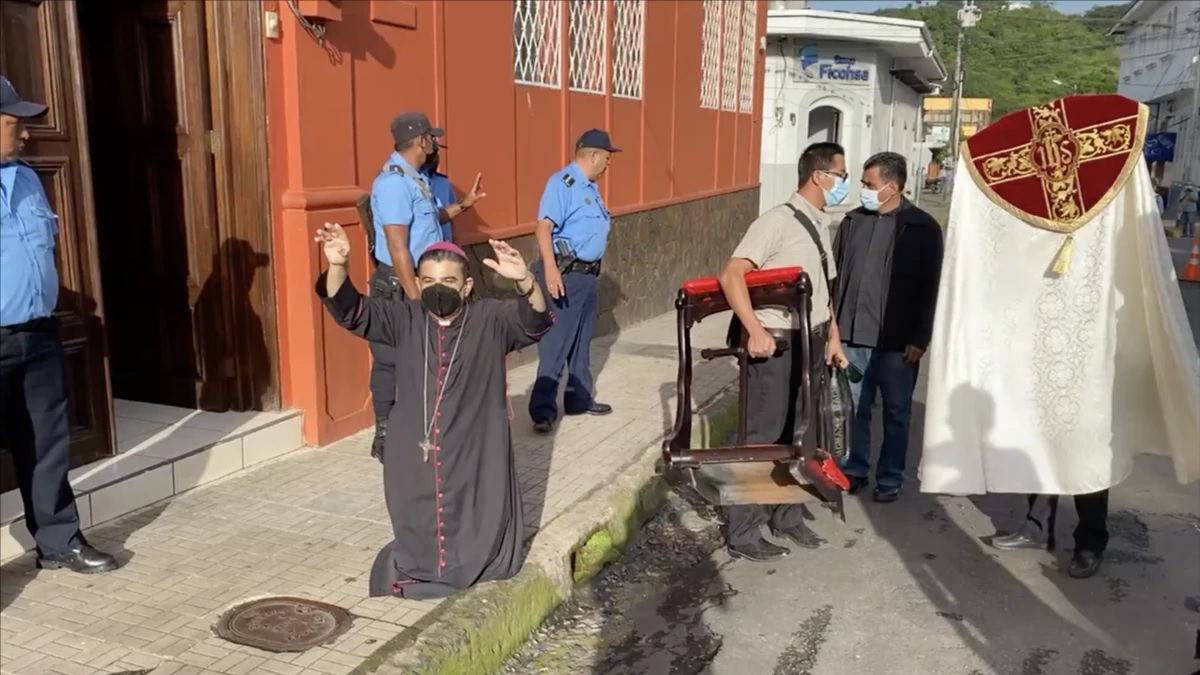The latest wave of repression by the regime of Daniel Ortega-Rosario Murillo is hitting the Catholic Church in Nicaragua, punishing those who try to denounce the human rights problems of Nicaraguans.
That, according to the “Political Analysis Supplement” report published in August by the Costa Rica-based think tank Center for Transdisciplinary Studies of Central America (CETCAM).
Meanwhile, the report “Nicaragua: A Persecuted Church? 2018-2022,” by lawyer Martha Patricia Molina, a member of the Observatory for Transparency and Anti-Corruption in Nicaragua, records and systematizes attacks on the Catholic Church from the outbreak of the socio-political crisis in April 2018 to May 2022.

“The Ortega-Murillo dictatorship wants to destroy the Catholic Church in Nicaragua because the bishops and priests speak the truth and denounce the arbitrariness, corruption, impunity, injustices, and disproportionate use of force by the National Police and the Nicaraguan Army,” Molina said.
“The Catholic Church is not willing to worship the dictatorship that has completely erased the country’s separation of powers and institutionality.”
“The regime’s confrontation […] with the Catholic Church is reaching one of its highest points, and it [the regime] wants to force them to take one of three paths: silence in the face of the situation in the country, imprisonment or banishment if they do not lower their heads,” CETCAM said.
“This escalation of confrontation […] against the Church [aims] to silence any critical or non-submissive voices that exist. Therefore, the Church and, in particular, certain religious leaders are considered by Ortega and Murillo as ‘enemies’ who hinder the assertion of their ruling power.”
According to Molina, there have been various attacks on the Church, such as graffiti on churches and anonymous messages; desecrations of churches and robberies; public threats from people close to the regime; aggression, persecution, harassment, and pressure to leave the country; restrictions and suspension of the legal status of non-profit and charitable religious organizations.
On August 1, the dictatorship stepped up its offensive against Catholic Church leaders, ordering the closure of eight Catholic radio stations in the Diocese of Matagalpa, the Catholic news website Vatican News reported.
Days later, police moved into the Episcopal Curia of Matagalpa, where they detained Bishop Rolando Álvarez, ten clergy members, and a cameraman for 15 days.
Through “Twitter,” the police accused “the Catholic Church, led by Bishop Rolando Álvarez […] of organizing violent groups and inciting them to commit acts of hate against the population.
On August 19, police announced that Álvarez remained under house arrest and that the rest of the clergy would be transferred to the Justice Assistance Directorate prison in Managua, known as “El Nuevo Chipote.”
On the same day, the Inter-American Commission on Human Rights condemned the repression against the clergy and called on the regime to immediately cease these actions, release Bishop Álvarez and the others detained, provide information about their whereabouts, and guarantee their right to life and personal integrity.
In 2022, the Ortega-Murillo regime also outlawed and banned other members of the Catholic Church.
In July, the National Assembly revoked the legal status of the Missionary of Charity Foundation of St. Teresa of Calcutta and expelled eighteen missionaries who maintained a home for young children.
In March, the regime expelled Archbishop Waldemar Stanislaw Sommertag, the Vatican’s ambassador to Managua since 2018.
The Vatican said the measure was incomprehensible because the bishop had worked tirelessly for the good of the Church and the Nicaraguan people during his mission.
“All the trials of the 205 political prisoners, including priests, seminarians, and lay people, are not following the law.
In Nicaragua at the moment, the law of the jungle, the law of the strongest prevails, and in any case, that is Daniel Ortega and his companion because they have the armed forces on their side,” concluded Molina.
With information from Latina Press

